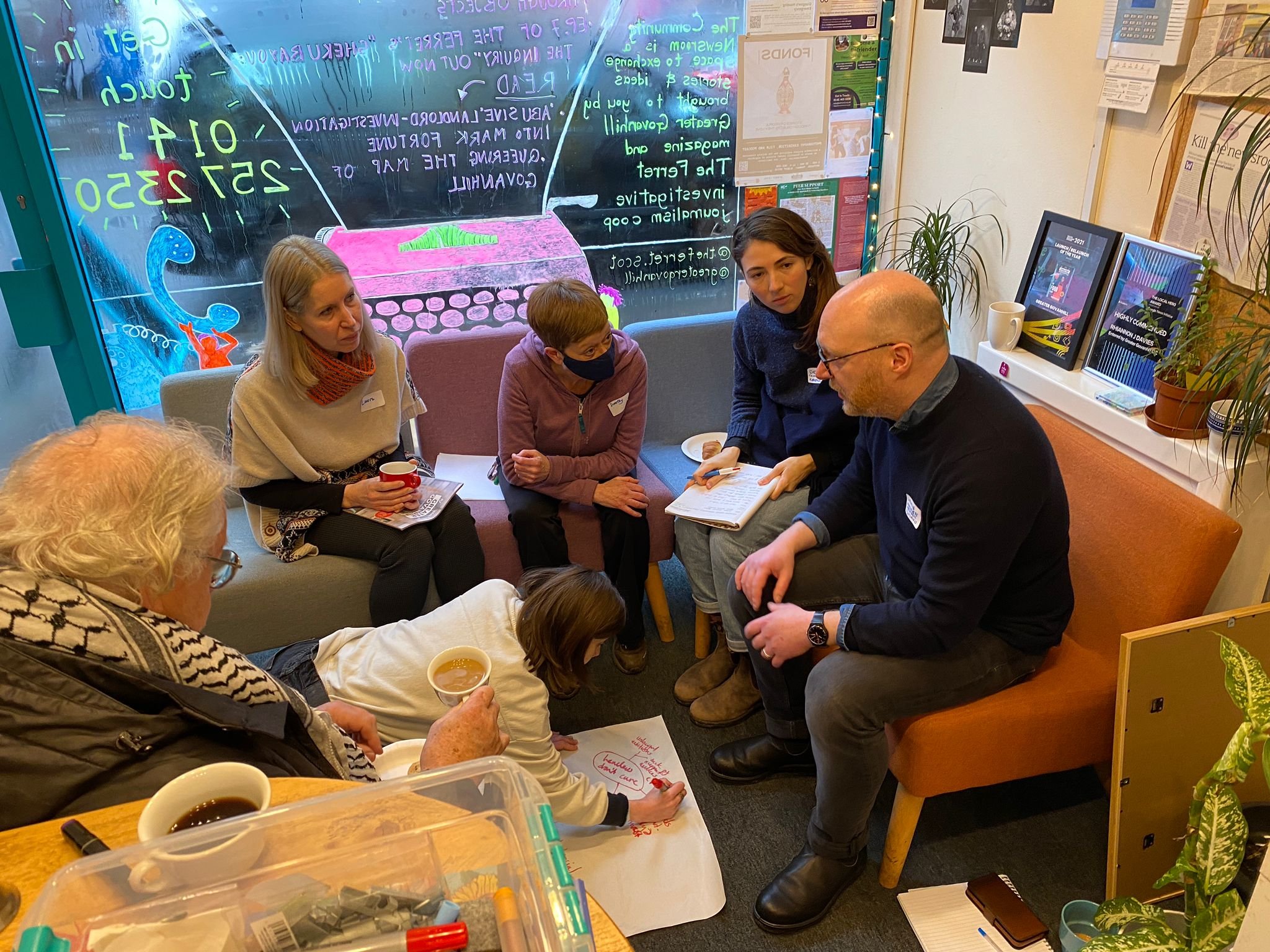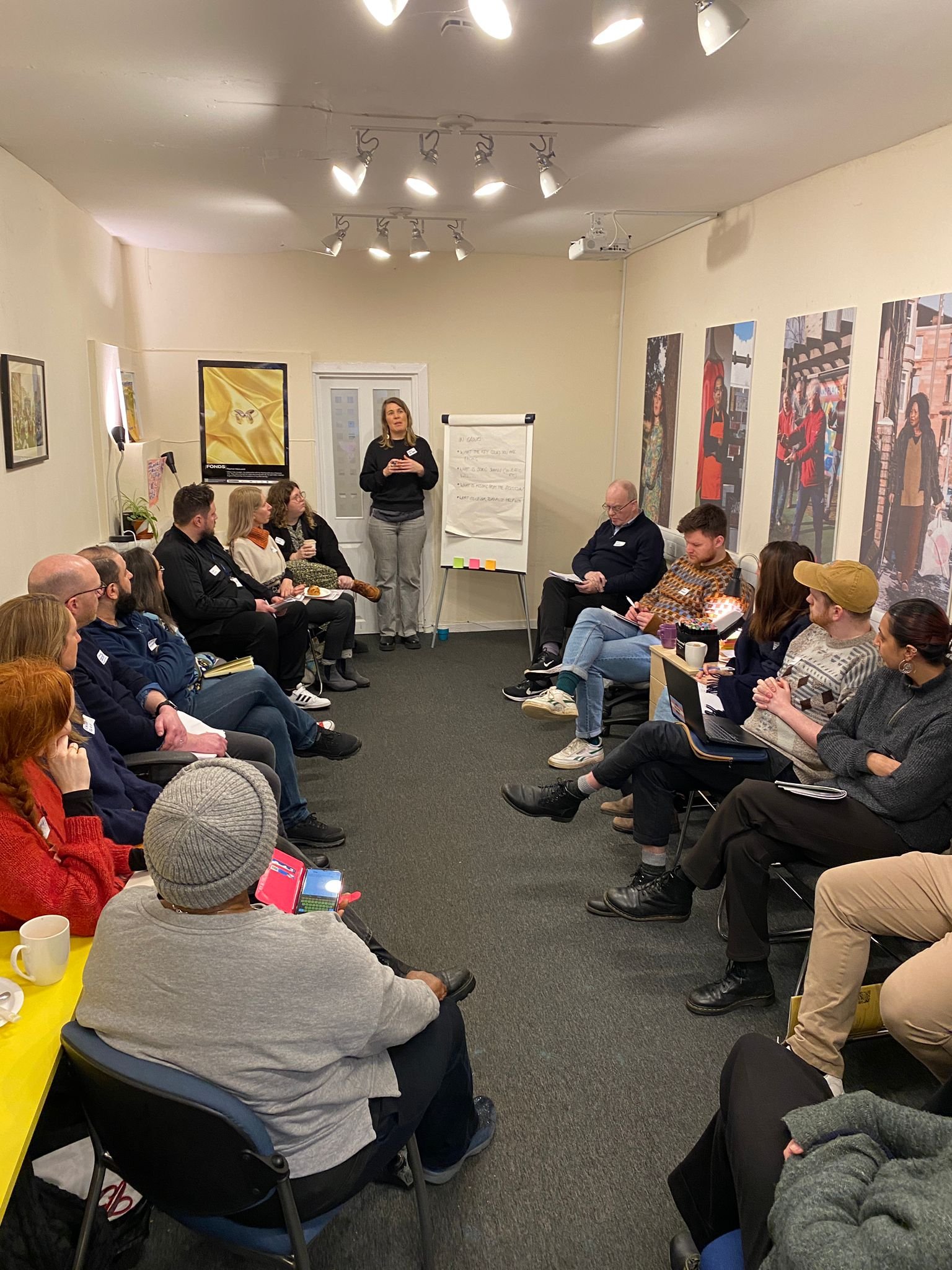Open House at the Community Newsroom: Glasgow’s Housing Emergency
We held an inaugural Open House event in the Community Newsroom, alongside The Ferret. These meetings will take place every month, to find the stories that matter to our community the most and to connect with local people and professionals. Residents, representatives from community organisations, and industry experts were invited along to hone in on and discuss a pressing issue affecting the local community and what can be done about it. This month we focused on and led a discussion on the housing crisis here in Scotland.
Words by Karin Goodwin, Rhiannon Davies & Devon McCole | Images by Rhiannon Davies
Scotland is in the grip of a housing crisis with open homeless applications at record levels, rising numbers of people sleeping rough, and thousands spending months or even years in temporary accommodation. Meanwhile private rents are spiralling along with the cost of living crisis and budget cuts continue. Edinburgh, Glasgow and Argyll and Bute councils have all declared a housing emergency and there are calls for the Scottish Government to do the same.
Here at the Community Newsroom we decided to host an Open House to gather people’s experiences of the housing crisis and our collective ideas for better reporting on the matter. If you were unable to attend, or came along but have more to say, share your thoughts here.
We Asked:
What are the key issues you are facing?
What is being covered well (by the media or other communication channels)?
What is missing from the discussion?
What could our journalists help with?
We heard:
Homeless accommodation: [general population but also young people and refugees]
There’s a lack of information and communication for people when they first become homeless or when they are first living in homeless accommodation. “The case worker doesn't know you or your situation. If you don't know the city/where to go, no one helps.” - - - People don’t know their rights so can’t challenge what’s happening.
Support services are “sub-par”.
One asylum accommodation provider stops people from complaining, acts as a block and doesn’t help.
Chicken and egg problem of affordable housing: Increase of homelessness makes the need for quality social housing more pressing. There is a lack of affordable housing which is pushing people into sky-high private accommodation.
Timescales for young people to get accommodation are not being met. Similar issues to those who get refugee status - they should have priority but this doesn’t seem to be happening.
- Hostels don’t feel safe. Living conditions in these can be so bad, prisons seems better/can be safer.Young people are becoming homeless so parents can keep tenancy (ie - don’t get child benefits after 18).
‘The system works against people”: People being not being bailed if homeless/or being let out into homelessness. Difficulty moving between local authorities and finding accommodation.
- There are deaths in temporary accommodation and they aren’t being properly monitored.
- Rough sleeping is rising.
Private lets
Levels of rent are not fair and unaffordable.
Landlords are not fixing problems and blame is being shifted on to tenants.
People don’t always feel safe to join campaign groups like Living Rent.
Lack of support for struggling tenants (profits over people)
The system is broken on so many levels (mental/physical health problems, addiction or social isolation are seen as route problems that affect people’s ability to hold down housing)
There’s even less support for people in private lets. (One participant said they knew someone whose housing benefits just weren’t stretching far enough and, when they increased, she told the landlord to let them know they should make the rent they had been struggling with. Their landlord responded by increasing their rent.)
Roma community tend to deal with private landlords a lot - private builds don’t have enough rooms for bigger families - lack of consideration for Roma needs.
Private houses are nowhere near value for money; mould, poorly insulated, broken boilers…paired with profiteering landlords…)
Lack of enforcement when landlords are in breach of the law.
Social housing
Lack of support for struggling tenants (profits over people)
Housing associations are too corporate. Questions were raised about where the money’s going (what are profits or funding being spent on).
Too much cosy PR (want to know what housing associations are actually doing, what are they building and why, who is it for, are they meeting community needs or corporate)
Leadership and communities:
‘Leaders don’t care about the problems.” More and more budget cuts are piling up.(absence of much need services push more people into homelessness and housing affected)
Living beside derelict land can negatively impact on mental health. It’s not being put to its best use.
Politicians are also landlords (conflict of interests).
Commercial property and student accommodation are being favoured over social housing.
Boarded up/derelict properties (how many are there - can these properties be ‘flipped’).
Pitting asylum seekers and refugees against indigenous community: feels like deliberate division.
Sexual violence - women being unable to leave due to housing situation.
What’s working?
Housing First is having some success in getting people into supported tenancies, but not at large scale.
Maryhill, Wyndford campaign to save community high rise flats.
Community organising in other areas: ie Living Rent meetings at Milk Cafe.
In other areas they have had more success in flipping temp accomodation into permanent residence - in Perth for example. but pressures here are more severe.
Sanctuary Housing using support worker to deal with rent arrears.
What’s missing?
Better rent caps/control on private landlords.
Proper enforcement of rent caps and infringement of tenants rights.
Focus on tenants/people - human experiences.
A coalition of organisations (taking housing crises forward and uniting interest groups)
UN already admonished UK govt, accountability mechanisms missing!! Issues should be taken to the UN again?
What can journalists do?
Stick with the story…keep following up and don’t let it drop. Too much dipping in and out.
It’s not just a story…remember this is real people’s lives.
People struggle to trust journalists so work harder to gain trust. (Be trust worthy, model good consent practices, do what you say you will etc).
More campaigning journalism is needed.
Set-up more mobile community newsrooms across Scotland to report on local issues like housing, that really matter. [Ferret local but with self-organising chapters?]
]Highlight the solidarity campaigns and the good things that are happening in communities as well as the problems! [Asset based approach needed].
Create briefings on issues to keep the community informed.
Use translators to ensure everyone can contribute.
Suggested investigations….
Would like to see jourlists do an investigation into what the council will do with the 300+ derelict properties they recently purchased to transform into public housing.
Would like to see an investigation into council housing repairs. How long are people waiting for repairs? Are the council fulfilling their role?
Glasgow’s ‘Ghettos’ (isolating infrastructure). Different from the US but similar in terms of the flyovers creating forgotten communities.
Stagnation of social security - prices go up but benefits don't. Young people get less benefits for being under 25, despite costs being the same (this is discrimination).
Scottish human rights bill is coming - raise profile of need for people have a right to “dignified right to housing”: help feed into a campaign that can be taken to the UN.
What now?
We’ve met to discuss future investigations and we’ll keep you posted on these and get in touch with those who we hope can help as we start to map out stories and investigations on the housing crisis.
Again, if you were unable to attend, or came along but have more to say, please share your thoughts here.
And keep in touch: Sign up to our substack here.
Come to our six month update in June so we can share our work and find out what’s next. Invites will be sent out next month for your diaries.

